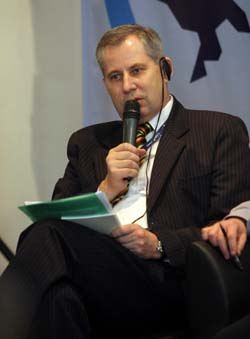On national self-identification
Experts advise Ukrainians to look into their mirror and their neighbors’
During the discussions at the recent Europe-Ukraine International Forum, the invited experts sought to define the essence of a nation’s historical memory, and how it is connected with European identity. The dialog took place without the planned speech of Kateryna Yushchenko, who heads the supervisory council of the Ukraine-200 International Charitable Foundation. Speaking in her place was Oleksii Kopytko, who presented his view of historical memory, but the Ukrainian position was generally quite vague. Foreign experts were the ones who spoke more about European self- identity and the importance of history in the life of a nation.
The idea of the unity of history, the present day, and the future for all European nations was raised by Gunter Saathoff, a member of the board of the German foundation Remembrance, Responsibility and Future. “Every nation has the right to its past, to its self-identification. But one should look not only in one’s own mirror but in the neighbor’s as well,” Saathoff noted. “The European community can save its every member from defeat,” he continued. “Germany, for instance, did not recover from Nazism all by itself.” Pavel Lisitski, the editor in chief of the Polish newspaper Rzeczpospolita, disagreed with this assertion, noting that European identification is a difficult concept to grasp. “Approximately a hundred years ago there were no common values. Have they been formed by now?” he asked rhetorically.
While there were diverse opinions on the issue of all-European unification, the assembled experts agreed on the question of historical memory. Valdis Stals, the Director General of the Directorate of the Latvian State Archive, spoke for the generation that was deprived of its motherland 50 years ago. In his speech he managed to combine reason and consistency with emotion. Stals wished all Ukrainians a stronger faith in themselves and responsibility to the future generations: “Revere your land — it is your motherland. Don’t forget to teach your children history. Let them speak Russian, English, French, but do not let them think in any other language but Ukrainian.”
Advice to Ukrainians was also offered by Porgi Schopflin, a Hungarian parliamentarian. He emphasized that Ukrainians should finally start living today and be guided by the future, not only by past tragedies.
The idea of new chances and prospects for our country was advanced by Andrew Wilson, a senior lecturer at the School of Slavonic and Eastern European Studies in London. In his view, Ukraine can become an “alternative East” for Europe and play a major part in the life of the European nations. “European history is impossible without Ukrainian history, and not just because of the Trypillian culture,” Wilson said.






